

Gauteng sets R218m aside for university students. Even though universities don’t fall under Gauteng’s jurisdiction, the provincial government said on Tuesday that it supported the students' call for access to quality higher education Delivering her mini budget speech for Gauteng, Finance MEC Barbara Creecy said the country’s economic hub would support the students’ demand to expand access to quality higher education, especially for students from poor and working class families.

“While the funding of tertiary education is not in our remit, we have in the current financial year set aside R218m for bursaries to assist our youth to pay fees at both the universities and FET colleges,” she said. Interview: UCT Vice-Chancellor Max Price. * This is an edited transcript.

Part II, which will be published later this week, focuses on the issue of insourcing and negotiation challenges between workers, students, management and Nehawu. - Ed Max Price, when Daily Maverick met with him the first time last week, looked tired, but better than one might have expected; under the circumstances, one might even say chipper. The impression one gets, talking to him, is that the situation at UCT is a little more contained than it is at UWC and CPUT – not only because the protests are less volatile, but because the university began discussing the processes now set in motion some years ago. How 'black tax' cripples our youth's aspirations. There is a certain anxiety that comes with knowing that your aunt, who raised you for a good part of your adolescent life, might not have money to buy a loaf of bread.
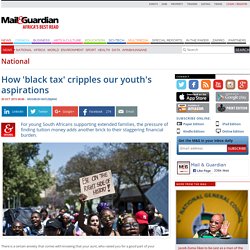
Or when you are inundated with “Please call me, need cash pls” SMSes from your close cousin, who used to provide reasons for needing the cash – R35 for 15 minutes at the internet café to submit a job application, perhaps – but no longer bothers with the details. You convince yourself that the regular tithe you pay to your family is fair and due, and that you can manage. Until your skorokoro breaks down in the middle of a busy intersection on the day you have an important meeting with your boss and new clients – and you remember your manager’s doubtful “Are you sure you can handle this account?” As the tow truck wheels off with your car, and realise that the R1 750 it is going to cost you was to have paid for the petrol to ferry family members to a funeral in Mpumalanga. The Negotiator: A view from the top floor of #FeesMustFall. 1.

The trouble No matter which direction you’re facing, the view from the eleventh floor of the Senate House building on the East Campus of the University of Witwatersrand is a view of privilege. If you’re facing south, looking out over the railroad yards and the Central Business District, it’s probable that a) you’re resting your privileged bones in a wingback armchair in the lounge, or b) you’re delighting your privileged palate with a gourmet meal in the dining room. If you’re facing north, looking out over the jacarandas and oaks of Johannesburg’s upper income suburbs, it’s probable that a) you’re sitting in the executive office of one of the privileged members of the vice-chancellor’s management team, or b) you are one of the privileged members of the vice-chancellor’s management team. How #FeesMustFall relates to SA schooling – my Sunday Times article. [Below is the full and slightly extended text of my Sunday Times article awkwardly titled “While the rich get education, SA’s poor get just ‘schooling’” [8/11/2015] Looking back on the last 30 days in South Africa you cannot help but conclude that the issue of university exclusion on financial grounds has struck a nerve in the national psyche.
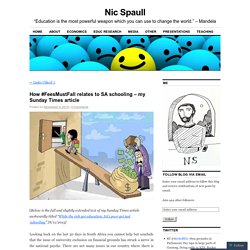
There are not many issues in our country where there is universal consensus across issues of race or class, and yet this is one of them. Deserving students should not be excluded from university because their parents cannot afford the fees. This is unjust, unsustainable and unacceptable as almost everyone now agrees. 11% of students wonât pay back govt loan - News24 survey results. Cape Town - We asked News24 users to have their say on the government’s National Student Financial Aid Scheme (NSFAS) and how it currently operates.
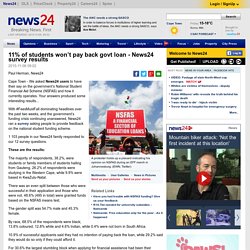
Your answers produced some interesting results... With #FeesMustFall dominating headlines over the past two weeks, and the government’s funding crisis continuing unanswered, News24 ran a survey asking people to provide feedback on the national student funding scheme. Parliament Diary: Ramaphosa loves students, but doesn’t know yet how to fund them. There is a kind of bingo you can play, these days, when ANC bigwigs discuss the crisis in funding for higher education.
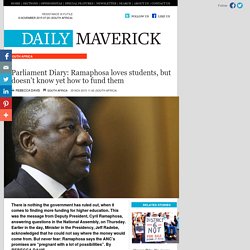
There will be reference to the fact that the youth are the future. There will be reference to the idea that the private sector has a major role to play in solving the problem of the funding deficit. And there will definitely be use of the ANC’s catchphrase of the moment; that the current fee crisis is the result of the government being “a victim of its own success”. If you’d been watching Deputy President, Cyril Ramaphosa, taking questions in Parliament on Thursday, you would have been able to check all of these off on your sheet.
The lines did not all go down smoothly with the gathered MPs, however. Theconversation. If one tracks South African student activities in 2015 it becomes apparent that a new politics is bubbling below the surface of academic life.
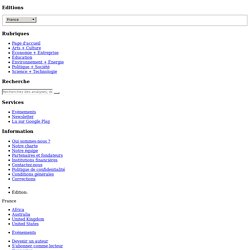
This first emerged with the #RhodesMustFall and #OpenStellenbosch protests, followed more recently by #FeesMustFall. The underlying issues driving this movement are about citizenship, belonging, inclusion and exclusion. Op-Ed: #FeesMustFall and the status of 'post-apartheid South Africa' Many people are still reeling after the last few weeks of #FeesMustFall protests.
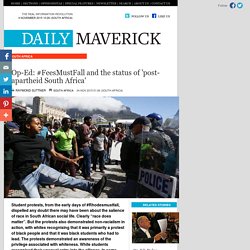
At the moment of writing, campuses are emerging from, or are in disarray, closed or operating with police presence, clearing up, assessing damage to property, and processing the potential for interdicts. Clearly the initial unity that students built was fragile, and has not always been able to hold as the protests played out. Some students wanted to continue demonstrations until long-term goals were realised, others believed it was time to pause or cease demonstrating altogether, and still others were just anxious to prioritise examinations and lectures. The very democratic character of the movement, in the case of many campuses where weight was placed on decisions by the student body, rather than representative bodies like Student Representative Councils (SRC), set limits on effective decision-making. It often meant that negotiations with authorities aroused suspicion, and were difficult to effectuate.
#FeesMustFall: Whatâs happened to money that should be going to funding? Cape Town - A forensic investigation is under way to get to the bottom of allegations that millions of rands intended for tertiary student funding are potentially going astray.
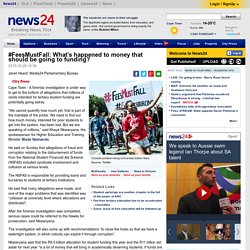
“We cannot quantify how much yet; that is part of the mandate of the probe. We need to find out how much money, intended for poor students to get into the system, has been lost. But we are speaking of millions,” said Khaye Nkwanyana, the spokesperson for Higher Education and Training Minister Blade Nzimande. More money for higher education - Habib. Johannesburg - The higher education sector is at risk due to lack of funding, the University of Witwatersrand said on Wednesday. "The amount of funding available for students wanting to pursue tertiary education is inadequate and well below that of international norms in similar developing countries," vice chancellor and principal, Professor Adam Habib said in a statement.
"The sector is at risk due to lack of substantial funding from the state and other societal actors. " The demand for financial aid outstripped the money available, he said. This was despite funds allocated by government to the National Student Financial Aid Scheme (NSFAS) having quadrupled over the last five years to R9.5bn, said Habib. For 2015, Wits has been allocated R179m by NSFAS. Technical colleges get lionâs share of cash. There was already a radical redirection of higher education funding going on when the #FeesMustFall movement began – but in the opposite direction. Financial aid funds have been directed from universities to the vocational and technical college system. What are the universities for? Not-poor-enough-for-nsfas-1.1939014# Theconversation. The #feesmustfall student movement in South Africa has garnered a great deal of popular support.
It has its critics, too. They have suggested that the country’s government and its universities simply can’t afford the free tertiary education students are demanding as their right. #FeesMustFall continues with victories and looks long-term. When the University of Witwatersrand (Wits) announced that classes would resume last Wednesday, those who had supported the student protests were split. There were accusations that those who wanted to continue with exams had sold out, and those who continued to disrupt the university were accused of holding others' education at ransom. A diminished group of students and staff continued the protests, and on Sunday won a major commitment from the university. That afternoon, after engaging with outsourced workers and students for two days, Wits Deputy Vice-Chancellor of Transformation, Tawana Kupe, announced agreements that the university hopes would allow the institution to re-focus on exams.
Most importantly, Wits agreed to insourcing “in principle”. As most universities around the country resume normal activities, the commitment on outsourcing at Wits is a major milestone for students and staff. NSFAS corruption a key contributor to fees crisis. Protests against university fee increases have gripped the nation over the last couple of weeks, as students from all over the country took to the streets to march against the ever-increasing price of higher education in the country’s public universities.
Using the hashtag #FeesMustFall the students garnered widespread support from South Africans and the international community. Powerful images of their protest have dominated media platforms across the world, as they call for a deeper look at the conditions that they claim have led to a disconnect between economics and humanity. Students say there is a need to look at a new funding plan for universities. Corruption Watch spoke to some of the Wits students who were marching and some of those who have sent reports to us, and many of them highlighted corruption at the National Student Financial Aid Scheme (NSFAS) as the main driver leading to a lack of funding to universities.
Turning the scheme around. Theconversation. Blade's 2012 report: Free university education for the poor is feasible and should be pursued. Final Draft Report of the Working Group on Fee-Free. Theconversation. University endowments: Spend now or pay for the future? Parliamentary diary: Teletubbies and grandstanding in student fees debate. #FeesMustFall: Wits splits - the beginning, not the end, of a chapter. Op-Ed: Access to free education requires further national dialogue. Theconversation. Op-Ed: Why is the state not a target of student protests? Op-Ed: A moment of possibility for universities.
#FeesMustFall: Political failure triggers ticking time bomb. #WitsFeesMustFall: The young and the restless take charge of a new revolution. State and universities are infringing on constitutional rights. Wits student leaders reject six percent increase. #FeesMustFall: The day Parliament became a war zone. Op-Ed: Being intelligent is not good enough if you are poor. Blade, society's moving on. Senzohlophe added: LIVE: Zuma to meet with student leaders. Op-Ed: The resurgence of South Africa's student movement. Janetjobson added: What is the best way to fund South African university education? Janetjobson added: #FeesMustFall protest turns violent, 21 October 2015.
Janetjobson added: theconversation. Janetjobson added: #NationalShutDown: Live blog. Theconversation. Theconversation. #FeesMustFall: South Africa must take conversation forward. Reporter’s Notebook: #FeesMustFall – the event we didn’t ‘cover’ Theconversation.